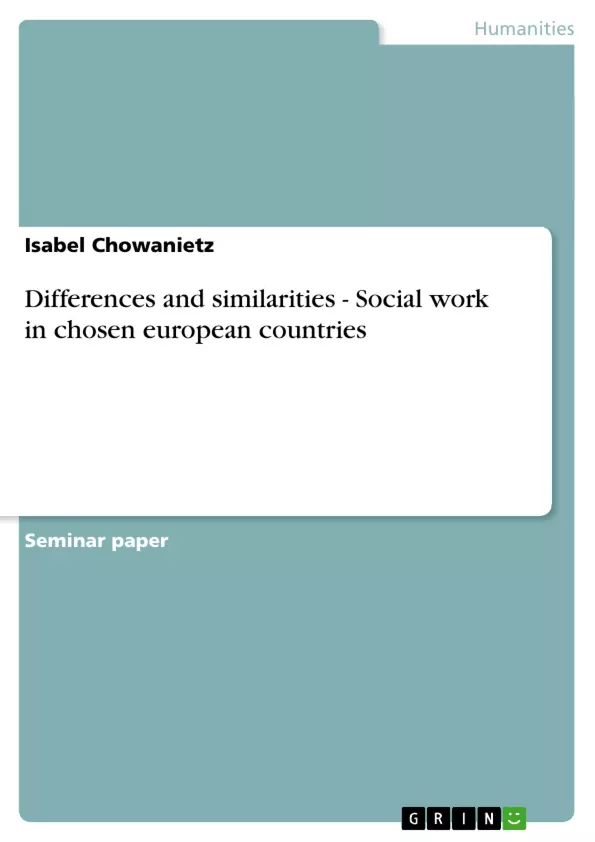The majority of my fellow-students is thinking about the possibility of working in other european countries. Not only the current unemployment rates and the bitter cuts in our welfare system are forcing future german social pedagogs to become familiar with the thought of leaving their home country. It’s also the fascination and a kind of curiosity of seeing how other countries are dealing with their specific social problems.
Which importance does social work have in other european countries? What are the main points concerning the work of social workers in specific european countries? What are the key themes in european social work?
These are the main questions I’d like to answer with this term paper. At first I’d like to define the term “welfare state” as a basic condition for social work. After that I’d like to shortly introduce the countries I’ve chosen for this term paper, also giving an insight into the different educational systems (to clarify the different conditions under which young people are able to receive the vocational training) and afterwards point out the different social work educations. After that I’d like to have a look at social work in a changing europe in general. At the end I’ll try to give a prospectus on the basis of the cognitions I’ve received concerning social work in Europe in general.
Inhaltsverzeichnis (Table of Contents)
- 1 Introduction
- 2 The term "welfare state"
- 3 About Germany
- 3.1 Social work education in Germany
- 3.1.1 Short excursus: The German educational system
- 3.2 The main tasks of social work/social pedagogy in Germany.
- 4 About Great Britain
- 4.1 Social work education in Great Britain
- 4.1.1 Short excursus. The British educational system
- 4.2 The main tasks of social work/social pedagogy in great Britain.
- 5 About France
- 5.1 Social work education in France
- 5.1.1 Short excursus: The French educational system.
- 5.2 The main tasks of social work/social pedagogy in France
- 6 Social work in a changing Europe - a critical conclusion.....
Zielsetzung und Themenschwerpunkte (Objectives and Key Themes)
The main objective of this term paper is to explore the similarities and differences in social work practices and educational systems across selected European countries. This analysis aims to provide a deeper understanding of the current state of social work within the changing European context.
- The significance of the "welfare state" in European social work
- The role and structure of social work education in different European countries
- The main tasks and challenges faced by social workers across selected European countries
- The impact of globalization on European social work and welfare systems
- A critical examination of the current state of social work in a changing Europe.
Zusammenfassung der Kapitel (Chapter Summaries)
The introduction delves into the concerns and motivations behind the study, focusing on the current unemployment rates for social workers in Germany and the growing interest in exploring international opportunities.
Chapter 2 defines the concept of "welfare state" and its relevance to social work, highlighting its different interpretations across various countries.
Chapter 3 offers an introduction to social work in Germany, outlining its educational system and the key tasks of social workers in the country.
Chapter 4 explores social work in Great Britain, including a discussion of its educational system and the specific roles of social workers in the British context.
Chapter 5 focuses on the French social work system, providing insights into its educational structures and the primary duties of social workers within the country.
Schlüsselwörter (Keywords)
The central themes and concepts explored within this term paper include social work, social pedagogy, welfare state, European social work, social work education, globalization, and the changing landscape of European social work.
Frequently Asked Questions
What is the focus of this social work comparison?
The paper compares the differences and similarities of social work practices and education in Germany, Great Britain, and France.
How is the "welfare state" defined in the paper?
The welfare state is defined as the basic structural condition that shapes how each country addresses its specific social problems.
Why are German social workers looking for jobs in other European countries?
Factors include current unemployment rates in Germany, cuts in the welfare system, and a curiosity about international social work methods.
What are the main tasks of social workers in France?
The paper details the specific educational requirements and the primary social pedagogical duties within the French system.
How does globalization affect European social work?
Globalization creates a "changing Europe," leading to new challenges for welfare systems and a need for international professional mobility.
Are there significant differences in social work education?
Yes, each country has a unique educational system and vocational training path for becoming a social pedagogue or social worker.
- Citation du texte
- Isabel Chowanietz (Auteur), 2006, Differences and similarities - Social work in chosen european countries, Munich, GRIN Verlag, https://www.grin.com/document/65818



